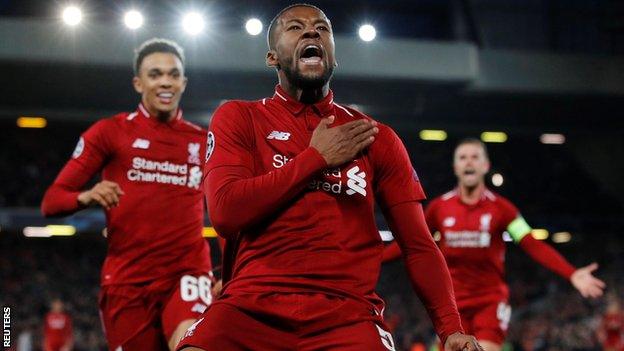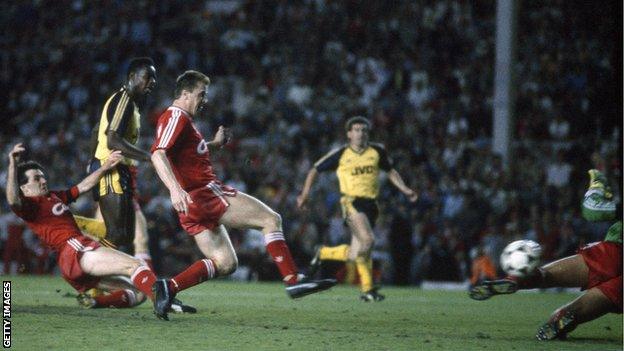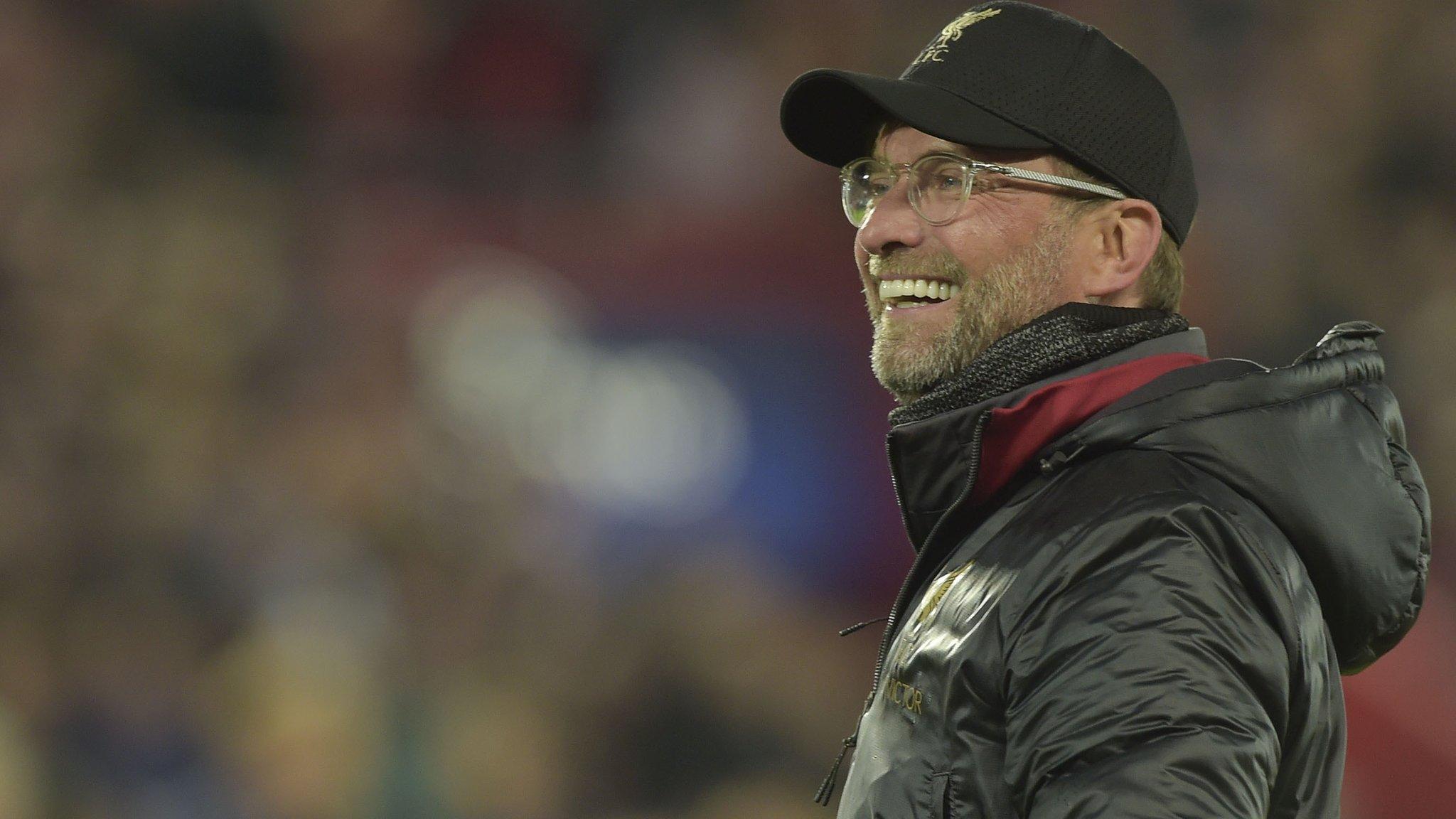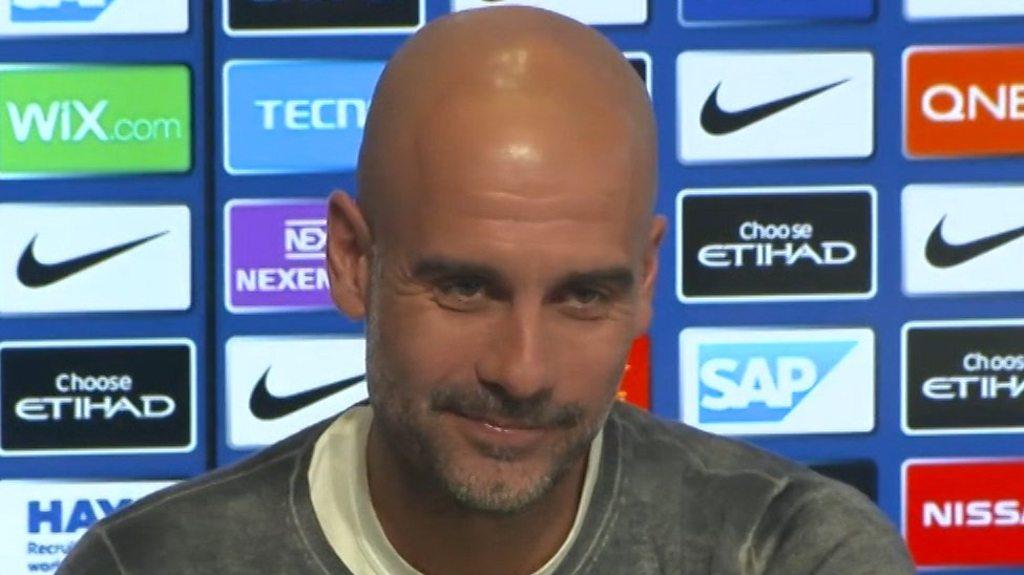Premier League title race: 'English football has never seen anything quite like it'
- Published

Manchester City are aiming to become the first side since Manchester United in 2008-09 to lift back-to-back Premier League titles
There have been points in this football season where you can feel as if you are watching the climax of some artfully scripted 10-part box set.
It's there in a record-breaking Premier League title race, the implausible Champions League comebacks, the goalscoring landmarks of Lionel Messi and Cristiano Ronaldo. Kicked off by a World Cup that reignited the connection between England fans and the national team, coming to a crescendo in Madrid with a final that few thought could happen and fewer still want to miss.
Every year brings moments of genius and the hype to buttress them. Elite football has always had its superstars capable of moments that we are not. Plenty of top-flight titles have gone down to the wire.
This time the sublime is where you might expect it and where you might not. There is a clip online from Plymouth's League One match against Portsmouth in February, where midfielder Graham Carey beats his full-back with a drag-flick-fake that you have to watch several times to understand.
A decade ago people would have been raving about it for months. In 2019 it has passed by almost unnoticed. The clip has not gone viral. Carey is 29 years old and has never played higher than the third tier of English football. It's just normal.

Liverpool will face Tottenham in Madrid after both sides made dramatic come backs in the Champions League
It's there too in the official goal of the season compilation for Sheffield Wednesday, a club whose season has been at best underwhelming. There are strikes in there - Fernando Forestieri's long-ranger against Norwich, at least two from Adam Reach alone - that would have sat quite comfortably in a nationwide best-of 20 years ago. Now they're happening for a team that finished exactly halfway down the Championship table and never threatened to win anything.
Yet if casual brilliance is everywhere, nowhere is it more obvious than in the title battle between Manchester City and Liverpool.
Whatever happens at the Amex and Anfield on Sunday afternoon - and quite a lot could still happen, after the week this has been - English football has never seen anything quite like it.
You can ignore the stat about the lead changing hands 32 times, if you like. A fair amount of that is down to television scheduling. In 2001-02 it switched 28 times, with four teams in the hunt rather than two.
If Brighton upset the considerable odds against City it will struggle to match the drama of Sergio Aguero 2012 or Michael Thomas 1989. Arguably too the drama of seeing two giants of the game contesting the title cannot match the impossibility of Leicester City's triumph three years ago. This City side could never be 5,000-1 to win anything.
Man City fans relive that Aguero goal from 2012
Yet other records lie smashed and broken. The first time two teams have both won more than 90 points, the highest tally for a team finishing second, the most combined wins between the top two in Premier League history.
If you adjust the old numbers for three points for a win, Liverpool would have ended with 98 points in 1978-79 (from 42 games). But they already have five more than Arsenal's Invincibles of 2003-04.
That Arsenal team drew 12 matches. This season City have drawn twice, Liverpool lost once. City have scored more goals at home in all competitions than any English team in history.
There are the numbers and then there is the manner in which they have been compiled. You define your footballing eras by the swagger and style of the very best teams, and these two have altered the way we imagine the game can be played.
City have taken the original Pep Guardiola blueprint and tweaked and expanded it to something that would have seemed ludicrous when the Premier League began. The neat triangles of tiki-taka have morphed into more complex geometric shapes, the movement of its players become harder still to track.
Everyone floats. Everyone can play. Wingers are strikers, strikers relentless workers. The goalkeeper passes the ball like a celebrated creative midfielder of 30 years ago.

Liverpool had a three-point advantage over Arsenal going into the final game of the season at Anfield in 1989. Michael Thomas' last-minute strike meant the Gunners won the match 2-0 and the First Division title on goals scored - the teams had an identical goal difference
It is a sweet sort of bullying, a relentless swarming of the busy and quick and ruthless. And it works, like little has worked before. City have won their past 13 league games. They have not been behind in any of them. In all that time, against the best the rest of the league can offer, they have conceded only three goals.
If City swamp you with passing and movement then Liverpool come at you like a gale and from everywhere on the pitch. They have the best defender in the country and two other defenders who are more dangerous in attack than most wingers.
Trent Alexander-Arnold and Andy Robertson have both breezed past 10 Premier League assists apiece. They have taken what used to be expected of a full-back and redefined it even beyond the great attacking and overlapping full-backs of the recent past.
The midfield work and track and work some more. The three up top run and twist and turn you inside out. Mohamed Salah and Sadio Mane are 5ft 9in tall, Roberto Firmino 5ft 11in. Small is beautiful and brutal and won't ever let you rest.
Not everything in the English game is as attractive. Football in the flesh is still priced out of the reach of many and the best of its live televised offerings behind a satellite paywall.
There are great clubs who have lost their identity, far more successful at marketing and leveraging their brand than matching that fine history on the pitch. In the 12 months from February 2018 Premier League clubs spent more than £260m on payments to agents. Something has gone wrong when the battle for seventh becomes a thing.
It continues down the pyramid. Three-quarters of the teams in the Championship make a financial loss. Debt among the 72 league clubs runs at close to £1bn. Grassroots football is underfunded, the facilities for future generations nowhere close to matching the wealth enjoyed by the very few at the top.
The trick that the English game has done is to produce football that makes it easy to forget all that other stuff. The performance is so good that the backstage doesn't seem to matter.
You support City and Liverpool in this era and you're carried along by the excitement and flair and the possibilities that flow from them. You watch on even when you don't and are swept along with it all the same.
- Published10 May 2019

- Published10 May 2019

